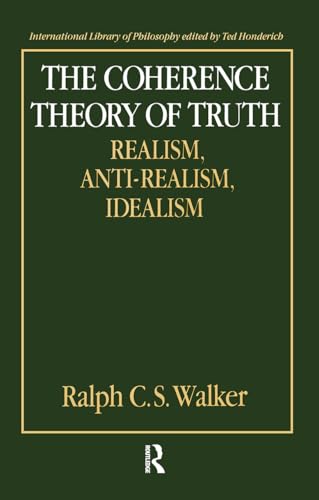

Are the correspondence theory and the coherence theory of truth incompatible with deflationism?ġ4. In which sense are the correspondence theory and the coherence theory of truth incompatible?ġ3. This is because, coherence theorists claim, we can only ground a given belief on other things we. What does idealism consist in? Are coherentists committed to it? Are idealists committed to coherentism?ġ2. This puts coherence theories in the epistemic view of truth. Kantian philosophy became increasingly well known. What does anti-realism consist in? Is anti-realism committed to a coherence account of truth? Are coherentists committed to anti-realism?ġ1. The meaning of COHERENCE THEORY is the theory that the ultimate criterion of truth is the coherence of all its separate parts with one another and with. The coherence theory of truth emerged in the work of Immanuel Kant at the end of the eighteenth century. Blanshard defines truth in terms of the rational or the. It is the 'theory of knowledge which maintains that truth is a property primarily applicable to any extensive body of consistent propositions, and derivatively applicable to any one proposition in such. Is true in that world that dogs have two legs? Assuming the coherence theory of truth is the correct one in every world, is it true that if there were no beliefs there would be no truth at all?ġ0. The criteriology of truth - Fundamental aspects of the coherence theory of truth - Programmatic considerations governing a coherence account of truth. In this paper I examine five essential themes in Brand Blanshards coherence theory of truth. According to one view, the coherence theory of truth regards truth as coherence within some specified set of sentences, propositions or beliefs. Assume the correspondence theory of truth is right, and let Birdland be a country in which "dogs" means "birds". How satisfactory are these answers in philosophical terms?ĩ. State the seven objections against coherentism Walker considers, along with his answers. JONATHAN COHEN THE COHERENCE THEORY OF TRUTH (Received 19 december, 1977) The purpose of this paper is (I) to determine what the coherence theory - in. True ideas are true because they are useful, and they are useful because they are true.

A statement is true when it coheres a larger body of beliefs. Statement is true if it corresponds to how things are in reality. What’s Walker’s designated set of believes other beliefs must cohere with to be true?Ĩ. Terms in this set (17) Correspondence Theory of Truth. To some, a truth proposition may be offered through simple consistency. It can be defined in several different ways. What’s Russell’s main objection to coherentism? How does Walker reply to this objection?Ħ. The coherence theory of truth states that there is coherence within any true propositions offered within a specific set of boundaries or definitions. What does the coherence theory consist in?ĥ. COHERENCE THEORY OF TRUTH Within Platos Socratic Dialogues we routinely observe the character of Socrates employing a formal, yet largely unexplained. The Regress Problem presupposes that justification. What does the correspondence theory consist in?Ĥ. Coherentism is a theory that challenges the presuppositions of Foundationalism and of the Regress Problem. What’s the difference between a theory about the nature of truth, a criterion for truth, the concept of truth, and the meaning of the truth predicate? In which of these categories do correspondentism, coherentism, and deflationism fall?ģ. Finally, to find a solution for the second problem, we can, by formulating the coherence theory in the light of this kind of propositions, use the criterion of the efficiency of the system of beliefs in order to make a choice between two alternative coherent systems of beliefs.1. It will become clear that the hinge propositions derived from the later Wittgenstein's epistemological ideas, would be an efficient solution to the isolation objection. Then, reviewing the coherence theory, we will provide a solution for these two problems. Reschers experiences led him to seek practical applications for his philosophical expertise, and he ventured beyond academic philosophy to draw upon empirical. In the beginning, we will examine two assumptions of the coherence theory of truth, which lead to these two problems, and the two problems themselves. First, the Problem of the system of beliefs isolated from the world and second, the problem of evaluating alternative coherent systems of beliefs.

In this essay, we would review the coherence theory of truth from the viewpoint of the later Wittgenstein's philosophy, in order to answer the two problems with which this theory faces. Categories: 19th Century Philosophy, Coherence Theory of Truth, Francis Herbert Bradley, History of Western Philosophy.


 0 kommentar(er)
0 kommentar(er)
